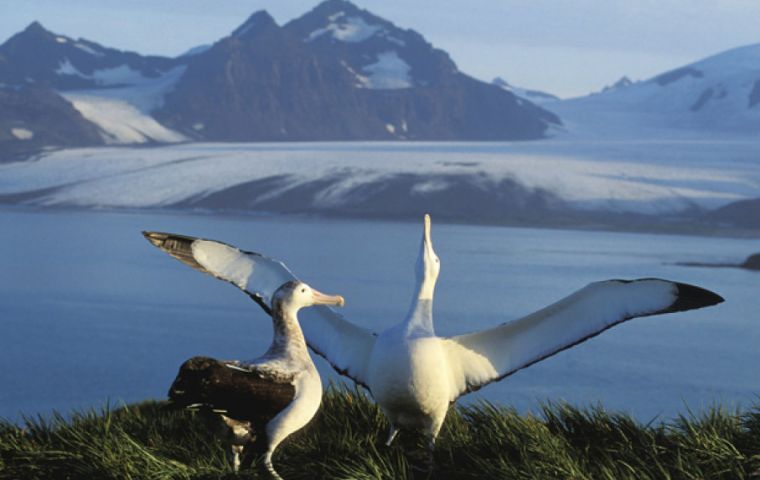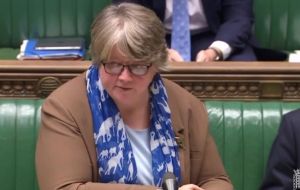MercoPress. South Atlantic News Agency
Albatrosses ‘Bird-borne’ radar project to enhance UK Overseas Territories environment
 One of the successful schemes will see albatrosses and petrels benefit from further research using ‘bird-borne’ radar devices
One of the successful schemes will see albatrosses and petrels benefit from further research using ‘bird-borne’ radar devices  Environment minister Therese Coffey said protecting nature in BOTs will help make activities as agriculture, fisheries, forestry and tourism more sustainable
Environment minister Therese Coffey said protecting nature in BOTs will help make activities as agriculture, fisheries, forestry and tourism more sustainable  Minister for BOTs Lord (Tariq) Ahmad of Wimbledon said UK’s OTs have some of the world’s most pristine waters and natural environments
Minister for BOTs Lord (Tariq) Ahmad of Wimbledon said UK’s OTs have some of the world’s most pristine waters and natural environments Seventeen innovative new projects will receive UK Government funding through the Darwin Plus initiative, to help protect and enhance the environment in the UK Overseas Territories. The seventh round of funding under the initiative, worth around £3.75m, will be shared amongst 17 projects around the globe. The funding will support international nature and help to achieve many of the commitments in the UK Government’s 25 Year Environment Plan.
The diverse array of projects receiving funding include radar tracking of albatrosses in the South Atlantic and protecting wetlands in the Caribbean.
“These 17 projects receiving funding through Darwin Plus will make a significant contribution to international conservation, demonstrating the UK’s global leadership in this field”, said Environment minister Therese Coffey. “Protecting and enhancing nature in our Overseas Territories will help to make crucial activities such as agriculture, fisheries, forestry and tourism more sustainable.”
Likewise the Minister for the Overseas Territories Lord (Tariq) Ahmad of Wimbledon said that “The UK’s Overseas Territories have some of the world’s most pristine waters and natural environments, from the polar regions to the Caribbean, and we are committed to doing all we can to preserve them.
“This funding will help conservation projects continue their good work, boosting protections for wildlife and supporting sustainable livelihoods which will preserve our precious environment for future generations.”
One of the successful schemes will see albatrosses and petrels benefit from further research using ‘bird-borne’ radar devices. The project is being run by scientists at the British Antarctic Survey (BAS), the attached radars will measure how often tracked wandering albatrosses interact with legal and illegal fishing vessels in the south Atlantic to map the areas and times when birds of different age and sex are most susceptible to by-catch – becoming caught up in fishing long lines.
The project’s results will be shared with stakeholders to better target bycatch observer programs, monitor compliance with bycatch mitigation and highlight the impact of by-catch on seabirds.
The UK is a signatory to the Agreement on the Conservation of Albatrosses and Petrels (ACAP), part of the Convention on Migratory Species of Wild Animals (CMS). This agreement has been extremely successful in substantially reducing levels of seabird by-catch in a number of important fisheries where rates have been reduced to virtually zero from levels that were historically concerning.
Professor Richard Phillips, leader of the Higher Predators and Conservation group at the British Antarctic Survey (BAS) said: “The British Antarctic Survey is delighted to be awarded this funding from Darwin Plus, which is for a collaboration between BAS and BirdLife International. The project will use a range of technologies - GPS, loggers that record 3-D acceleration and novel radar-detecting tags - to quantify interactions of tracked wandering albatrosses with legal and illegal fishing vessels. The technology will provide much-needed information on the areas and periods of highest by-catch.”
Darwin Plus will deliver commitments in the 25 Year Environment Plan on nature and protection of the natural environment in the UK Overseas Territories. Round 7 of Darwin Plus received 51 applications, the highest number ever. In 2018, 13 projects were awarded funding.
Other projects receiving funding in this latest round include protecting wetlands in the Caribbean and strengthening bio-security measures on St Helena and Ascension Island, Pitcairn and Tristan da Cunha.
The British Geological Survey has received funding to explore the South Sandwich Trench, one of the deepest parts of the southern ocean at approximately 8100 meters, as part of the Five Deeps Expedition. The project will use a Deep Submergence Vehicle (DSV) Limiting Factor, the only full ocean depth manned submersible and a fleet of free-fall landers which will deliver scientific equipment to the sea floor to acquire video and physical samples.
Professor Stephen Blackmore, Chair of the Darwin Plus Advisory Group said: “The range of the projects funded by Darwin Plus in our British Overseas Territories shows how we can effect change and better support and protect nature around the globe.
“I am proud that we are delivering Darwin Plus funding to benefit animal and plant species and their habitats, which are vital to humanity's economic and social development.”
Darwin Plus provides funding for Environmental projects in UK Overseas Territories and Fellowships for UK Overseas Territories (OT) Nationals to train in the UK. The fund is administered by the Department for the Environment, Food and Rural Affairs (Defra), with additional funding support from the Foreign and Commonwealth Office.




Top Comments
Disclaimer & comment rulesCommenting for this story is now closed.
If you have a Facebook account, become a fan and comment on our Facebook Page!